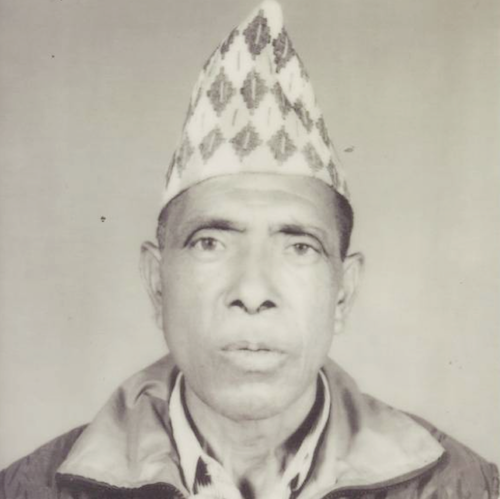Retired teacher actively involved in social activities disappeared in 2001
FACTS
On 31 December 2001, on his way to see the Chief District Officer, Tej Bhandari was brutally arrested – without reason – by a group of men in uniforms that awaited him at the Manangay Chaitara bus station. He was beaten unconscious in front of bystanders and then handcuffed, blindfolded, and thrown into the back of a police van, taken to an undisclosed location and never seen again. Following his disappearance, members of the army and police force repeatedly broke into Tej Bahadur Bhandari’s home, threatened his wife, destroyed possessions, and stole money for a two-week period.
Read more: here
Procedure
Tej Bahadur Bhandari’s wife and son took several steps to locate him in the days following the arrest, but authorities denied that he had ever been detained, before admitting there was an investigation pending. In January 2002, Tej Bahadur Bhandari’s son reported his father’s disappearance to Nepal’s National Human Rights Commission, who made inquiries into Tej Bahadur Bhandari’s whereabouts. The Chief District Officer stated that he had been killed in crossfire following an attempted escape. Tej Bahadur Bhandari’s son, Ram Bhandari, filed two cases with the Supreme Court, receiving threats from army officers as a result, and was himself arrested and detained for a short period.
In December 2010, almost nine years after his father’s disappearance, Ram Kumar Bhandari, Tej Bahadur Bhandari’s son, filed an individual complaint with the Human Rights Committee, represented by TRIAL. The Human Rights Committee decided the case in October 2014.
The Human Rights Committee found Nepal responsible for the enforced disappearance of Tej Bahadur Bhandari. It condemned the State for failing to conduct an investigation or to prosecute and sanction the perpetrators of the crime. It further found that the anguish and stress suffered by Ram Kumar Bhandari as a result of his father’s disappearance amounts to a violation of the prohibition on torture and ill-treatment.
Read the decision: English
The video about the struggle of Ram Bhandari can be found here and the book written in memory of his father can be found here.
RECOMMENDATIONS
The Committee recommended that Nepal carry out a thorough and effective investigation into Tej Bahadur Bhandari’s disappearance and locate the his remains, which should be returned to his family, who should in turn be provided with detailed information on the results of any investigation. It further recommended that Nepal must prosecute, try and punish those responsible for the violations committed and provide compensation as well as adequate psychological rehabilitation and medical treatment to his family.
| Investigation into the facts of the case, prosecution and sanctions of the perpetrators | |
| Nepal has failed to adopt measures with regard to the investigation, prosecution and sanction of those responsible. Nepal continues arguing that investigation into conflict-related crimes must be carried out by transitional justice bodies in spite of the well-established case law of the Committee that holds that transitional justice mechanisms cannot replace judicial remedies in cases of gross human rights violations. | |
| Information on the investigation and, in case of death, locate the remains and hand over to the family | |
| No information on the progress of the investigation and on the existence of any concrete plan to locate, exhume, identify and return his father’s mortal remains has been provided to the family of Mr Bhandari. | |
| Provision of adequate compensation | |
| Although the government considers support of the interim relief as compensation, such support cannot replace the compensation victims should receive. The family of Mr. Bhandari has not received any form of compensation for the harm suffered. | |
| Adequate psychological rehabilitation and medical treatment | |
| No psychological rehabilitation or medical treatment has been provided, with measures of reparation being referred to the non-judicial transitional justice mechanisms | |
| Amendment of domestic legislation on enforced disappearance, torture | |
| Albeit the new Criminal Code (entered into force in 2018) codifies the autonomous offences of torture and enforced disappearance, the definitions of the crimes enshrined therein and the corresponding regulation – concerning, for instance, statutes of limitation and compensation – remains at odds with international law. | |
| Translation and dissemination of the decision | |
| The Views of the Human Rights Committee on this communication have been translated into Nepali but not disseminated widely. |
Note these are unofficial gradings as the Human Rights Committee has not yet commented on implementation.
EFFORTS FOR IMPLEMENTATION
- Numerous letters sent to the Office of the Prime Minister, the National Human Rights Commission, the Ministry of Peace and Reconstruction, the Office of the Attorney General, the Ministry of Law and Justice, and the Ministry of Peace and Reconstruction, on February and September 2015
- Meeting of Mr. Bhandariand/or his legal representatives with representatives of the Office of the Prime Minister, the National Human Rights Commission, the Ministry of Peace and Reconstruction, the Office of the Attorney General, the Ministry of Law and Justice, and the Ministry of Peace and Reconstruction, on February, September, October and November 2015
- Follow-up report to the Human Rights Committee, October 2015
- Meeting of Mr. Bhandari’s legal representatives in Geneva (TRIAL) with the Human Rights Committee, November 2015
- Right to Information Application seeking information on implementation of the decision filed to the Office of Prime Minister, November 2015
- Follow-up report to the Human Rights Committee, December 2015
- Numerous letters sent to Human Rights Unit of the Office of the Prime Minister, Ministry of Law and Justice, National Human Rights Commission, Office of Attorney General, Ministry of Peace and Reconstruction in July 2017
- Follow-up report submitted to the Human Rights Committee, August 2017
- Joint- follow-up report submitted to the Human Rights Committee, October 2018
- Collective Follow-up report to the Human Rights Committee, June 2020

